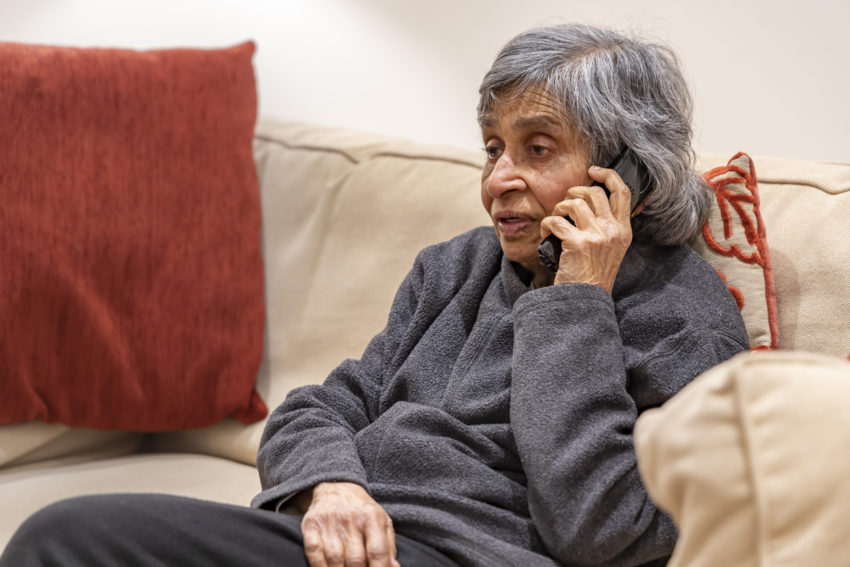
Share On Social!
Latino seniors face many health disparities, including disproportionate rates of disability, Alzheimer’s, cancer, and more.
Additionally, they may have trouble communicating with healthcare workers due to bias, discrimination, and lack of bilingual and culturally competent staff.
A new resource wants to help elderly Latinos get quality healthcare by helping them navigate Medicare.
Anhelo is an online and phone service that Spanish speakers can use to better understand their Medicare coverage options and ensure it meets their needs.
Resources like Anhelo, along with other policies, can vastly improve the healthcare experience for Latino seniors.
What Problems do Latino Seniors Face in Accessing Healthcare?
Many barriers stand in the way of Latino seniors receiving proper healthcare.
Unfortunately, implicit bias and discrimination can be major barriers.
Implicit bias is preconceived notions that affect our understanding, actions, and decisions about others — and which operate beyond our conscious control.
Latinos often experience bias in the doctor’s office.
For example, Latino men are less likely to receive treatment for high-risk prostate cancer than white men. People of color who visit an emergency room in the U.S. are less likely to receive prescriptions for certain medications than white people.
Implicit bias and discrimination may go undetected if there’s a lack of healthcare workers who have been trained with cultural awareness or are bilingual.
Less than 6% of nurses are Latino, despite a large need for staff that understands and can communicate with Latino patients.
In addition to cultural reasons, there are also monetary barriers for many Latinos.
Latino seniors who are low-income and lack health insurance have difficulty accessing quality healthcare.
While the Affordable Care Act (ACA) improved Latino healthcare coverage, gaps still remain. The uninsured rate remains higher among Latino (25.1%) than white adults (8.5%).
Seniors may also struggle to access healthcare that is totally virtual, which was often the case with telehealth providers during the pandemic.
“17% of people over 50 still say they have never used any sort of video conferencing tool for any reason, including medical care. While that’s 11 percentage points lower than in the 2019 poll, that lack of experience or access could be a barrier to receiving care without having to leave home as the pandemic continues to surge in dozens of states,” according to University of Michigan Health Lab.
What is Anhelo and How Can it Help Latino Seniors?
Anhelo is a free phone and online service that hopes to address the barriers that Latino seniors face in accessing healthcare through Medicare.
Many Latino seniors have limited knowledge of Medicare.
“According to U.S. Census data, the number of Hispanics who qualify for Medicare is accelerating every year, yet nearly 70% of Latino adults have little to some knowledge of Medicare programs,” according to an Anhelo press release.
Through Anhelo, created by Medicare, Latino seniors can connect with Latino healthcare workers over the phone in Spanish to get their questions about Medicare answered and figure out how to set up a plan that best suits their needs.
“Anhelo will help our Hispanic seniors understand their available healthcare alternatives in a simple way, completely serviced in Spanish by a team who truly understands them,” said Dr. Juan Rivera, brand ambassador for Anhelo and Chief Medical Correspondent at Univision, according to an Anhelo press release. “This is a game changer that will help this community get the care that they deserve.”
Anhelo hopes this service will allow Latino seniors to be more empowered when it comes to health.
“We recognized there was an unmet need and deep desire for the elderly to be heard in this community and for their unique requirements to be taken into account when reviewing their Medicare options,” said Denira Borrero, Managing Director of Anhelo, according to an Anhelo press release.
“Anhelo is not about transactions, but rather about empowering Latinos with accurate information in their native language to help them make the best decision for them and their family.”
How Else Can We Help Latino Seniors?
More must be done to help Latino seniors access quality healthcare.
One important step is hiring more bilingual and culturally competent healthcare workers that can provide better services to Latino patients.
Everyone, including healthcare workers, can take steps to address implicit bias.
Learning about our implicit biases is important to ensure we treat others equally and aren’t causing harm to others with preconceived notions.
Download the free Salud America! Action Pack “Find Out If You Have Implicit Bias and What to Do Next.”
This Action Pack will help you see if you have implicit bias, learn from others who have overcome their own implicit bias, and also encourage others to learn about implicit bias, too.
By The Numbers
3
Big Excuses
people use to justify discriminatory behavior



